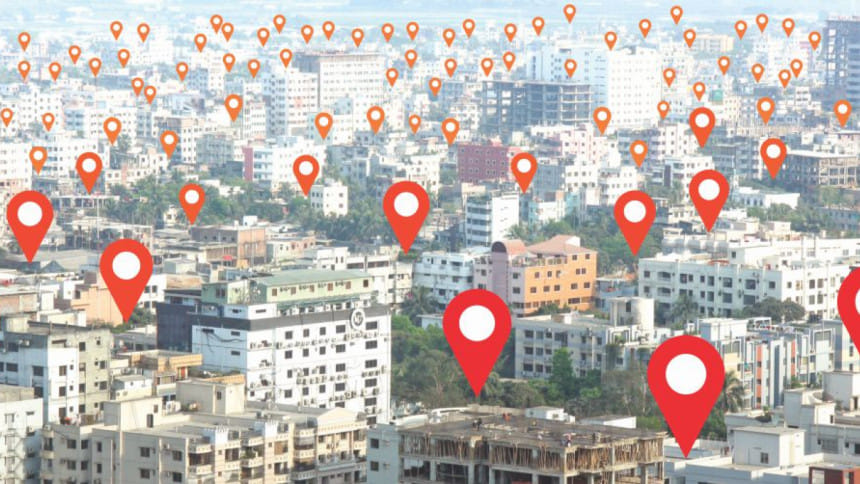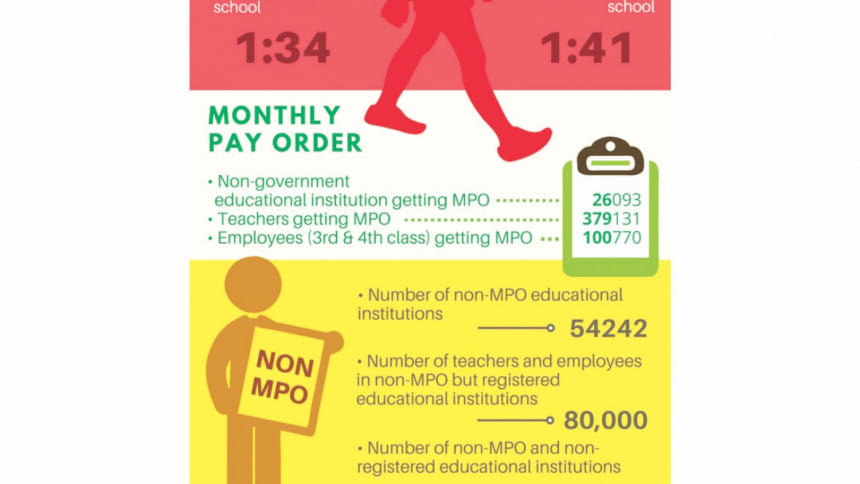Lure of the confirmed A+

The neighbourhood around Dhanmondi Lake is a quiet residential area. On each side of the narrow roads, there are only residential buildings, a few grocery stores and the tranquil greenery of Dhanmondi Park. However, every morning, the narrow roads surrounding the lake become some of the busiest in Dhaka city. There are at least 12 schools and two colleges operating within only one square-kilometre of this neighbourhood. Turning residential houses into schools, many of these improvised educational institutions do not even have basic facilities such as playgrounds, libraries, adequate number of classrooms, canteens and transportation for students. Some of these schools don't even have any approval from the government.
Dhanmondi is not the only area; most of the residential areas of Dhaka city, including Mohammadpur, Uttara, Azimpur and so on, are crammed with unauthorised schools. The writer contacted with one such school located in Azimpur, which was an academic coaching centre in 2016. When the government declared a ban on all coaching centres—an initiative which ultimately failed—its owners instantly turned it into a lower secondary school (up to grade eight), just by installing a billboard. The school lures its students in with the promise of "confirmed A+" grades and "100 percent confirmed suggestions [list of questions which may appear in the exam]" in the Primary School Completion and Junior School Certificate Exams.

Drawn in by these promises, when guardians bring their children to the school for admission, they find that their children are being registered, not as students of Royal Public School, but as students of different other government approved schools. When contacted, one of the founders of the school, reveals to Star Weekend, on conditions of anonymity, "Since the government does not grant permission to establish any more schools in Dhaka, all the new schools of the city are now following this practice. We request an approved school to register our students under their institution's banner so that the students can appear before the board exams."
"The students only take part in the board exams under those institutions, but we provide them with all the lessons and teaching-learning materials," he further adds. According to the Board of Intermediate and Secondary Education, Dhaka, there are only 301 authorised schools and 122 authorised colleges in Dhaka respectively.
However, according to an unpublished survey conducted by the students of the Institute of Education and Research, University of Dhaka, there are at least 1,300 unauthorised secondary schools and more than 600 unauthorised higher secondary colleges in Dhaka city. Their numbers could not be confirmed even by the respective government offices—in the government records these unauthorised institutions do not exist and as a consequence, these educational institutions remain beyond the purview of any type of government monitoring.
In fact, an investigation by Star Weekend found that many of these institutions are operating like coaching centres. The students' psychosocial development, which requires carefully planned co-curricular activities, practical learning through laboratory sessions and excursions, among other things, are never taken care of. For the most part, the teachers are not qualified enough, with many of these institutions recruiting university students as teachers. Sometimes they hire other school teachers on a part-time contract with the sole aim of helping their students obtain GPA 5 at any cost.
Such institutions have mushroomed all over the country and cater to a huge number of students. For instance, Star Weekend contacted another such unauthorised school that also started its journey as a preparatory coaching centre for cadet college admission exam, but now operates three branches of its secondary school in Uttara. Each of these branches teaches around 500 students and sends them to government approved schools to appear for their board exams. They have unauthorised schools and college branches in more than 30 districts.
In districts like Dhaka, Tangail, Bogra, Chittagong, this school operates multiple branches of schools and colleges. However, according to board officials, the school is only permitted to enrol students up to grade five.

A high-ranking board official says, anonymously, "These unauthorised schools are abusing a privilege which was intended for students with special needs and impoverished students. There is a rule which allows a school or college to register a board exam candidate through an external category if the student is unable to participate in the classes owing to financial problems or physical disabilities."
The board official also adds that the unauthorised schools enrol their students in multiple approved schools so that the board cannot question any particular school for registering so many external candidates. "Many political big shots are behind these unauthorised institutions. Please do not reveal my name in your report," he appeals.
According to a 2016 survey of Bangladesh Bureau of Educational Information and Statistics (BANBEIS), there are 19,847 government-approved secondary (private and government-run) schools in Bangladesh and 4,238 higher secondary educational institutions. BANBEIS officials told Star Weekend that in terms of secondary schools, Bangladesh has already reached its saturation point and there is no need to establish secondary schools except in a few remote chars (river-island) and haor areas. They explain, "The teacher-student ratio in secondary school and college is 1:41 and 1:32 respectively, which is quite satisfactory. The problem is that some institutions are overcrowded with students and some institutions get very few students, due to the institutions' poor performances. Therefore, the government is focusing more on enhancing quality of the existing secondary level institutions and discouraging quantitative increase of such institutions."
The question then is, despite having so many approved schools, why are the students going to unauthorised schools?
An answer lies in the bleak situation of authorised privately-owned secondary and higher secondary educational institutions, whose teachers recently staged a fast-until-death hunger strike, demanding regularisation of their jobs under the government's Monthly Pay Order (MPO) scheme. According to Golam Mahmudunnabi Dollar, acting President of the Federation of Non-MPO Educational Institutions' Teachers and Employees, "We have been taking classes for 22 years without any salary. Every year we are given hope that our job will be regularised and we shall get MPO. But this hope is never materialised. The budget of non-government schools and colleges are so small that we can hardly purchase essential teaching-learning equipment and furniture."
"Our schools can only charge limited fees from the students as fixed by the government but they do not get any support from them. Our teachers are not paid at all," he further adds.
These teachers are then forced to seek employment with coaching centres and unauthorised schools to earn an income. On the other hand, the unauthorised schools, remaining beyond the purview of the government monitoring, charge exorbitant tuition fees from the students by promising them "confirmed A+" in the board exams.
Due to the poor condition of the non-government, approved secondary schools and their teachers' affiliation with the unauthorised schools, the guardians are also more interested in enrolling their students in the latter.
There are two government bodies to monitor and supervise the academic activities of the schools. When asked about the monitoring and supervision process, the officials of the educational boards and Directorate of Secondary and Higher Education share a harrowing description. The duty of monitoring and supervising the secondary and higher secondary educational institutions of the country is shared by the inspectors of nine boards of intermediate and secondary education and district education officers under the Directorate of Secondary and Higher Education (DSHE).
Each board monitors secondary schools and intermediate colleges of six to seven districts. However, to monitor hundreds of educational institutions of these districts, each board only has one inspector for schools up to secondary level and one inspector for intermediate colleges.
When asked about how they monitor the school with only person, a school inspector of a board says anonymously, "It is actually impossible for us to visit every school in every district and inspect their academic activities. There are inspectors assigned by the Secondary Education Sector Investment Program (SESIP) under DSHE who are in charge of inspecting academic activities." However, the school inspector also reveals that the school inspectors of the respective boards actually visit a few schools in a district but report that all the schools shave been covered. The practice of taking bribes as "gifts" from the school authorities is also rife among school inspectors. The Education Minister Nurul Islam Nahid himself admitted as much, when he told school inspectors, "You can take bribe but take it within a tolerable level. I cannot order you not to take bribe..."
On the other hand, the school inspectors of DSHE claim that they are "toothless" inspectors who can only write reports on the academic performance and send it to the boards. According to DSHE officials, they cannot take measures against the low-performing schools, nor can they take any measures against the unauthorised schools. The DSHE officials further added that only the respective upazila or district administration can take measures against the unauthorised schools.
The officials argue that most of the non-government schools are owned by friends or relatives of local elected representatives. Whenever DSHE officials want to take any measures, the local representatives intervene and they have to stop. As a result, at present, monitoring and inspection activities in the secondary and higher secondary educational institutions are virtually non-functional.
Professor Dr Mamtazuddin Patwary of Bangladesh Open University thinks that there is no alternative to enhancing the institutional capacity of the schools and personal capacities of the teachers. The ministry must collect information about all approved or non-approved institutions—about their owners and teachers. Teachers of the educational institutions must be trained adequately. "People shouldn't be able to randomly open educational institutions wherever they want, or call themselves teachers without any proper qualification. If we want quality education, we must have quality educational institutions—there's no other alternative," he adds.
He also highlights that educational institutions must be freed from undesired intervention by political leaders and corrupt government officials. "Otherwise, our education system will completely collapse in the near future," he apprehends.
Several measures have been taken recently which can improve the situation. One of these measures is recruiting teachers in the non-government educational institutions through Non-Government Teachers' Registration and Certification (NTRC) exam which can prevent the recruitment of unqualified teachers. BANBEIS has also taken up a project to prepare a complete profile of all the students of the country, including their daily attendance and monthly academic performance, which will allow them to track the students' academic trajectory. This step can also prevent unauthorised educational institutions from running their operations under the shelter of approved schools and colleges. However, these initiatives may turn futile like the minister's promise to ban coaching centres if corrupt practices cannot be stopped among government officials and political leaders.
The writer can be contacted at [email protected]

 For all latest news, follow The Daily Star's Google News channel.
For all latest news, follow The Daily Star's Google News channel. 



Comments